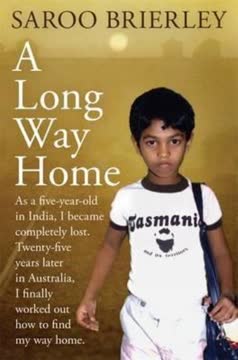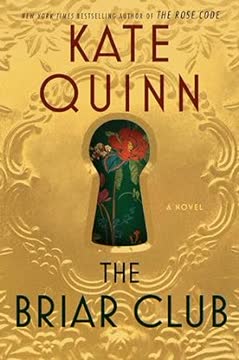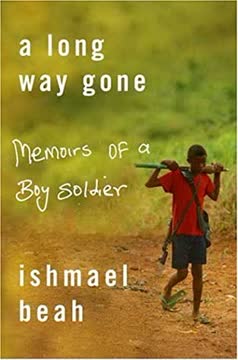Key Takeaways
1. A Child's World Shattered: Lost and Alone
I was lost.
Childhood innocence. Saroo Brierley's early life in Ganesh Talai, India, was marked by extreme poverty but also by the warmth of his family: his mother Kamla, older brothers Guddu and Kallu, and baby sister Shekila. His father's abandonment forced his mother into grueling labor, leaving the children to fend for themselves, often begging for food and relying on each other for survival. Despite the hardship, Saroo cherished memories of playing with Shekila and the simple joys of their communal life.
A fateful journey. At five years old, Saroo accompanied his beloved older brother Guddu to the nearby town of Burhanpur, where Guddu sought work. Exhausted, Saroo fell asleep on a train station bench, expecting Guddu to return. He awoke to find himself alone on a moving train, trapped in an empty carriage, hurtling away from everything he knew.
Overwhelming terror. The realization of being utterly alone and unable to escape the speeding train plunged Saroo into a state of sheer panic and terror. He cried, screamed, and banged on the locked doors, but no one heard him. This traumatic experience, lasting an estimated 12-15 hours, marked the beginning of his long and harrowing journey, severing him from his family and home.
2. Survival on the Streets: Resilience in the Face of Danger
I realized that to have any hope of returning home, I would have to be as strong as I could be.
Calcutta's harsh reality. The train eventually deposited Saroo in Calcutta (Kolkata), a sprawling megacity teeming with millions, where he was just another barefoot, hungry child. The sheer scale and anonymity of the city were terrifying, and he quickly learned that survival meant relying solely on his wits, scavenging for scraps of food, and avoiding the many dangers lurking in the streets.
Life-or-death lessons. Saroo witnessed horrific sights, including dead bodies on the riverbank, which underscored the brutal reality of street life. This experience, coupled with encounters with aggressive gangs and the constant threat of child traffickers, forced him to develop acute survival instincts. He learned to:
- Scavenge for food, often competing with other desperate children.
- Avoid uniformed officials and suspicious adults.
- Find hidden, temporary places to sleep, like under bridges or in abandoned buildings.
A conscious decision. Despite his young age, Saroo made a profound decision to pull himself together and fight for survival. This resolve, born from desperation, became the foundation of his resilience, allowing him to navigate the perilous streets of Calcutta for weeks, always holding onto the faint hope of finding his way back home.
3. The Kindness of Strangers: A Path to Salvation
For the second time, it felt like the kindness of a stranger had saved my life.
Unexpected help. Amidst the overwhelming indifference and danger of Calcutta, Saroo encountered moments of profound human kindness that proved crucial to his survival. An old, homeless man saved him from drowning in the Hooghly River not once, but twice, a silent guardian angel in his darkest hours. Later, a railway worker offered him food and shelter, a brief respite from the streets.
Betrayal and escape. The railway worker's initial kindness turned sinister when his friend, a well-dressed man, began asking too many questions, making Saroo uneasy. Trusting his instincts, Saroo made a daring escape, fleeing into the night and hiding in a sewage pipe to evade pursuit. This betrayal reinforced his wariness but also highlighted his growing ability to discern danger.
A pivotal encounter. His luck turned when a friendly teenager, noticing Saroo's plight, invited him to stay with his family and eventually took him to a police station. Despite Saroo's ingrained fear of authorities, the teenager's genuine concern convinced him to trust. This act of compassion led Saroo into the formal system of care, ultimately saving him from the streets and the grim fate of many homeless children.
4. A New Life, A New Family: Adoption and Adaptation
I understood that I had been awarded a rare second chance.
From orphanage to adoption. After being processed by the police and spending a month in the distressing Liluah juvenile detention center, Saroo was transferred to Nava Jeevan, an orphanage run by the compassionate Mrs. Saroj Sood. Here, he was offered a "new life" through intercountry adoption. He was shown a red photo album of his prospective Australian parents, Sue and John Brierley, and their seemingly luxurious home in Hobart, Tasmania.
A world apart. The Brierleys, driven by a desire to help children in need rather than have biological children, welcomed Saroo with open arms. His arrival in Australia was a stark contrast to his past: clean clothes, abundant food, a soft bed, and a loving, secure environment. He quickly bonded with his new parents, who patiently helped him adapt to a new language and culture.
Embracing a new identity. Saroo's transition was remarkably smooth, largely due to the Brierleys' unwavering affection and his own resilience. He embraced his new life, excelling in school and sports, and becoming "Saroo Brierley." The adoption of his brother Mantosh years later, though challenging due to Mantosh's more severe trauma, further solidified his sense of belonging in his Australian family.
5. Memories Endure: The Unspoken Promise to Remember
My memories were all I had of my past, and privately I thought about them over and over, trying to ensure that I didn’t “beget.”
A map on the wall. Despite his new life, Saroo never forgot his Indian family. His adoptive mother placed a map of India on his bedroom wall, a constant, silent reminder of his origins. He would stare at it, wondering where "Ginestlay" and "Berampur" were, the fragmented names of his hometown and the station where he got lost.
Preserving the past. Saroo meticulously replayed his childhood memories in his mind, a mental exercise to prevent them from fading. He recalled the layout of his home, the river, the bridge, and the faces of his mother and siblings. These memories, though sometimes painful, were his only link to his past and a source of quiet determination to one day understand what had happened.
A hidden quest. For years, Saroo kept his deep-seated desire to find his birth family largely to himself, fearing it might upset his adoptive parents or be seen as a rejection of his new life. However, the longing for closure and understanding remained a powerful undercurrent, shaping his identity and fueling a quiet, internal promise to one day unravel the mystery of his origins.
6. The Digital Quest: Google Earth Unlocks the Past
Google Earth was the perfect tool. It was almost as if it was invented just for me.
Renewed determination. Years later, during a period of personal reflection and with access to broadband internet, Saroo's dormant quest reignited. Inspired by conversations with Indian friends who understood the geography of his past, he decided to systematically search for his hometown. He realized that relying on vague place names was futile; a new, methodical approach was needed.
A thousand-kilometer radius. Saroo calculated that he must have traveled approximately 1,000 kilometers (620 miles) in 12-15 hours on the train. He drew a 1,000-kilometer radius around Kolkata on Google Earth, creating a manageable search zone. His strategy was to meticulously follow every train line radiating from Howrah Station, looking for familiar landmarks.
The breakthrough. After months of painstaking, nightly searching, Saroo stumbled upon a small blue train station symbol. Zooming in, he recognized a water tower, a pedestrian overpass, and a horseshoe-shaped ring road—all matching his vivid memories of "Berampur." The station's name: Burhanpur. Following the line further, he found a river with a dam wall, and then, the precise layout of his childhood neighborhood. The town's name was Khandwa, and his specific area, Ganesh Talai.
7. The Miraculous Reunion: Finding Family After 25 Years
Come with me. I’m going to take you to your mother.
A journey to the past. Armed with his Google Earth discovery, Saroo traveled to India, filled with a mix of anxiety and hope. His first steps in Khandwa confirmed his digital findings: the railway station, the underpass, and the familiar streets. He found his old, abandoned flat, a tiny, crumbling space that once housed his entire family.
An unexpected guide. Standing before his empty childhood home, a young neighbor approached. Saroo, showing photos of his younger self and reciting his family's names, was met with an astonishing response: a man appeared and declared, "Come with me. I’m going to take you to your mother."
The emotional embrace. Just meters away, around a corner, Saroo was led to three women. He instantly recognized his mother, Kamla (now Fatima), by the fine bone structure of her face. Their reunion was a torrent of tears, smiles, and speechless wonder, a moment of profound joy that transcended language barriers. His mother, who had never given up hope, was "surprised with thunder" at her son's miraculous return.
8. Bittersweet Truths: Joy and Loss Intertwined
Guddu had also never returned that night I was lost. My mother found out a few weeks later that he had died in a train accident at age fourteen.
The missing brother. Amidst the joyous chaos of reunion with his mother, sister Shekila, and brother Kallu, Saroo's most pressing question was about Guddu. He longed to tell Guddu he didn't blame him for getting lost. The answer was devastating: Guddu had died in a train accident weeks after Saroo's disappearance, found near Burhanpur.
A mother's double grief. Kamla had lost two sons on the same night, an unimaginable tragedy. Saroo learned that Guddu's body was so mangled, half an arm severed and an eye lost, that it was a horrific sight for his mother to identify. The family had no grave to visit, as houses were built over the old graveyard, leaving no trace of Guddu's final resting place.
Unanswered questions. Guddu's death left Saroo with a deep, unresolvable sorrow and lingering questions about that fateful night. He grappled with the thought that if he hadn't boarded that train, Guddu might still be alive. This bittersweet reunion, while bringing immense joy, also brought the pain of a loss that Saroo had to process anew, decades later.
9. Two Homes, One Heart: Embracing a Dual Identity
I had come to see that I’d had two homes, each with its own emotional connections, even if they were thousands of kilometers apart.
A complex belonging. Saroo's return to India and reunion with his birth family solidified a profound realization: he now had two homes and two families. While Australia and the Brierleys were his adopted home and family, where he was loved and belonged, Khandwa and his birth family also felt like "home," a place of blood and origin.
Bridging two worlds. The challenge became how to integrate these two distinct parts of his identity. His Indian family, despite their initial astonishment, expressed deep gratitude to his Australian parents for raising him. They understood that the Brierleys were his family, and they simply rejoiced in knowing he was alive. This acceptance allowed Saroo to embrace his dual identity without guilt.
Commitment to both. Saroo committed to supporting his Indian family, financially and emotionally, and to maintaining connections across continents through technology and future visits. His journey, initially driven by a need for answers, evolved into a lifelong commitment to nurturing both his Australian and Indian roots, recognizing that both were integral to who he had become.
10. Destiny's Path: A Journey of Hope and Reconnection
Everything is written: destiny takes its inevitable path.
The power of faith. Saroo learned that his mother had never given up hope for his return. She prayed constantly, and local priests assured her he was alive and well, pointing south. Her unwavering faith, and her decision to remain in Ganesh Talai so he could find her, were pivotal to their reunion, suggesting a powerful, almost telepathic, bond.
Inspiring hope. Saroo's story quickly garnered international media attention, transforming his personal quest into a global phenomenon. His miraculous return inspired countless others, particularly those who had lost family or faced seemingly insurmountable challenges. It became a testament to the human spirit's resilience and the possibility of miracles.
A new purpose. The journey of being lost and found reshaped Saroo's life, giving him a unique perspective and a platform to share his message of hope. He realized that his experiences, though traumatic, had led him to a blessed life and a profound understanding of family, identity, and the interconnectedness of humanity. His story became a beacon for others, demonstrating that even in the face of overwhelming odds, the search for home and belonging can ultimately lead to profound reconnection.
Last updated:
Review Summary
A Long Way Home is a memoir that recounts Saroo Brierley's extraordinary journey of being lost in India at age 5, adopted by an Australian couple, and reuniting with his birth family 25 years later. Readers found the story incredibly moving and inspiring, praising Brierley's resilience and determination. While some felt the writing could have been more polished or emotional, most agreed the remarkable true story overshadowed any stylistic shortcomings. Many reviewers were eager to watch the film adaptation after reading the book.
Similar Books
Download PDF
Download EPUB
.epub digital book format is ideal for reading ebooks on phones, tablets, and e-readers.










